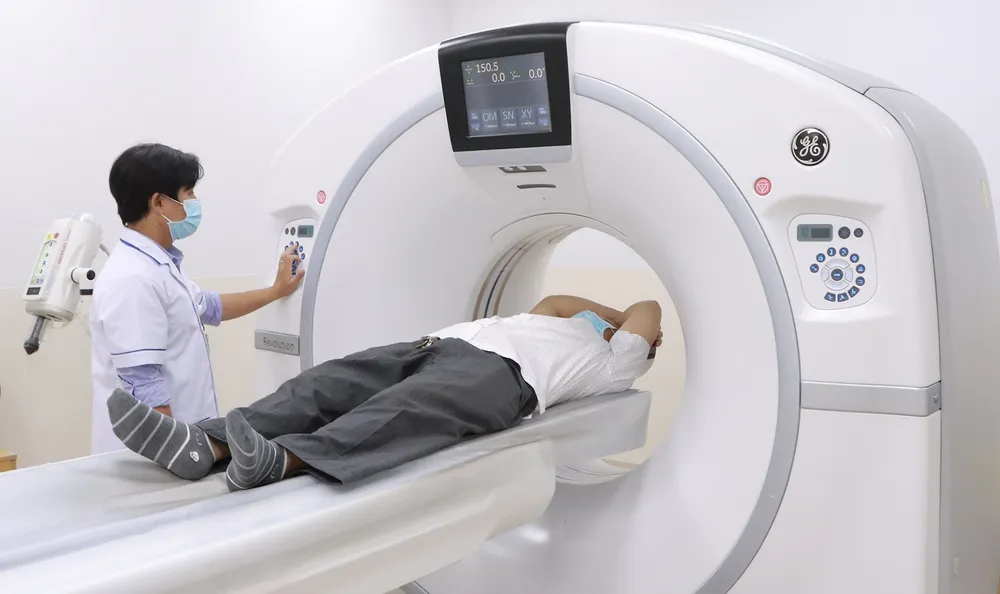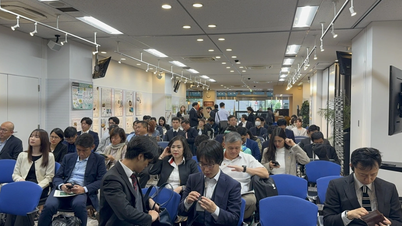
Hospital "shakes head"
For over a week, Ms. Nguyen Thi Nga (living in Tan Phu District, Ho Chi Minh City) had to run to all the hospitals in Ho Chi Minh City to find a place to do a PET/CT scan for her father because the doctor diagnosed that her father was suspected of having lung cancer. Initially, Ms. Nga went to the Ho Chi Minh City Oncology Hospital but they said there was no more radioactive medicine to operate the machine. She continued to take her father to Military Hospital 175 and Cho Ray Hospital but only received "head shakes"!
Mr. Nguyen Trong Phu (42 years old, living in District 3, Ho Chi Minh City) said he is preparing to take his wife with breast cancer to Hanoi for a PET/CT scan so that doctors can assess the severity of the disease and the rate of metastasis. "For cancer patients, the waiting time can cause the disease to progress to a severe stage, so my family is considering going to Hanoi to get an early scan," Mr. Phu worried.
According to Dr. Pham Thanh Viet, Deputy Director of Cho Ray Hospital in Ho Chi Minh City, the cyclotron (production of isotopes and radiopharmaceuticals) at Cho Ray Hospital has stopped operating after more than 17 years of use due to continuous problems. This is the only radioactive isotope production reactor in the South serving PET/CT imaging techniques. The installation process of the new reactor system is expected to last about 6 months.
Dr. Pham Thanh Viet said that the cyclotron is a particle accelerator used to produce short-lived radioactive isotopes such as F-18, Tc-99m... These are very important substances in medical imaging techniques (PET/CT, SPECT/CT) to evaluate organ function, detect cancer metastases, cardiovascular and neurological diseases.
The shortage of radioactive drugs in cancer diagnosis and treatment has occurred many times in Ho Chi Minh City. In 2019, some patients in Ho Chi Minh City had to go to Hanoi and Da Nang for PET/CT scans because the radioactive isotope production reactor located at Cho Ray Hospital was broken and had to be sent to the US for repair. In 2022 and mid-2024, the shortage of radioactive drugs also occurred, causing PET/CT machines at Military Hospital 175 and Ho Chi Minh City Oncology Hospital to stop operating.
Find alternatives
In Ho Chi Minh City, only Cho Ray Hospital, Military Hospital 175 and Oncology Hospital are currently equipped with PET/CT machines. However, when the only cyclotron in the South stopped operating, all PET/CT machines in Ho Chi Minh City as well as the southern provinces were left “under the covers”.
Dr. Diep Bao Tuan, Director of Ho Chi Minh City Oncology Hospital, said that the hospital has 2 PET/CT machines and they have been out of service since the beginning of June. Previously, more than 10 patients were scheduled for PET/CT scans every day, but now due to the lack of radioactive drugs, this activity has been interrupted... "The hospital is making efforts to submit a draft report proposing public investment to competent authorities to build a cyclotron at the Oncology Hospital to meet the needs of patients," Dr. Diep Bao Tuan informed.
According to doctors in the field of cancer, PET/CT is a means of diagnosing, monitoring, and treating many diseases, especially early detection of cancer using the radioactive drug 18F-FDG. While other imaging diagnostic methods are usually only applied to one area of the body, PET/CT can examine the whole body, helping to diagnose diseases at the cellular and molecular levels and has high sensitivity, specificity, and accuracy, capable of detecting lesions and diseases at very early stages.
PET/CT is not applicable to all cancer patients, but this technique helps detect metastatic lesions, assess the level of response, the risk of cancer recurrence and is especially effective in evaluating difficult cases. However, people need to understand correctly about early cancer screening and the role of PET/CT, because not all cases of early cancer diagnosis and detection require PET/CT. To diagnose and detect cancer early, patients should be initially examined with conventional techniques such as blood tests, urine tests, abdominal ultrasound, chest X-ray, electrocardiogram. If there are abnormalities, the doctor will prescribe other techniques such as CT scan, MRI and when these methods cannot detect the disease, PET/CT should be used.
Source: https://www.sggp.org.vn/lo-san-xuat-dong-vi-va-duoc-phong-xa-dung-hoat-dong-he-thong-chup-petct-o-phia-nam-bi-te-liet-post800446.html



























![[Photo] Nghe An: Provincial Road 543D seriously eroded due to floods](https://vphoto.vietnam.vn/thumb/1200x675/vietnam/resource/IMAGE/2025/8/5/5759d3837c26428799f6d929fa274493)


![[Photo] Discover the "wonder" under the sea of Gia Lai](https://vphoto.vietnam.vn/thumb/1200x675/vietnam/resource/IMAGE/2025/8/6/befd4a58bb1245419e86ebe353525f97)


































































Comment (0)